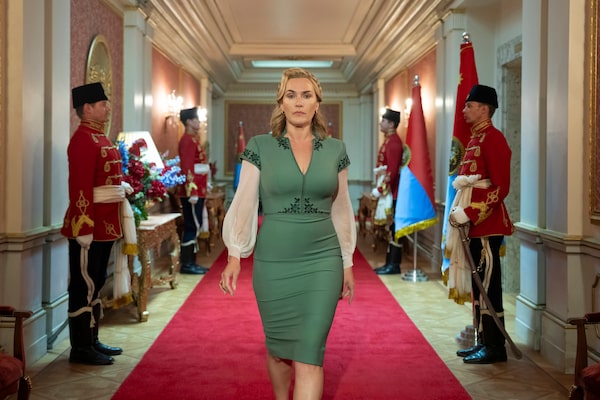
Kate Winslet plays Elena Vernham, the modern and far-right chancellor of a middle European autocracy, in The Regime.The Associated Press
Come for the political satire, stay for Kate Winslet.
That’s the most succinct way to sum up HBO’s latest limited series, The Regime, a six-part tale of a fictional authoritarian leader that premieres on Crave on Sunday. The project tees Winslet up for incredible character work on a physical and psychological level, yet story-wise, it fails to push the boundaries you want from this type of comedy.
The Regime follows a year in the life of Winslet’s Elena Vernham, the modern and far-right chancellor of a middle European autocracy known for its sugar beets, cobalt and somewhat shaky relationship with the United States. She’s a fascinating character with complex layers, which Winslet peels away in every scene.
In some, Elena is strong and capable, serenading international political guests with an off-key performance of If You Leave Me Now by Chicago while her French husband, Nicholas (Guillaume Gallienne), plays the keyboard. In others she’s an agoraphobic germaphobe with an irrational fear of mould despite her medical degree, ordering staff to set up dehumidifiers in every palace corner. Then there are the scenes where she pleads and argues with her dead father, whose body has been preserved in a crypt-like chamber.
Wigs, gaudy outfits and a wavering lisp delivered with a stiff, upper left lip all help bring Elena to life, proving that Winslet truly is a master of her craft. Thanks to these bold choices she’s unrecognizable from previous HBO turns (Mildred Pierce, Mare of Easttown), but equally mesmerizing. That’s true whether she’s taking a Zoom call in an ice bath, breathing through a panic attack or addressing the nation and her “loves” in her daily recorded messages from the palace.
Shōgun brims with enough intrigue, sex and carnage to warrant those Game of Thrones comparisons
Those palace scenes, by the way, filmed at Vienna’s Schonbrunn Palace, where the Habsburg dynasty used to summer. It was the creative team’s way of portraying a formerly thriving country that’s trying to keep up with the rest of the world on limited resources and big dreams.
The story kicks off with the arrival of Corporal Herbert Zubak (Matthias Schoenaerts), known to most as “the Butcher” for his part in the slaughtering of protesting miners. The chancellor likes that part of him, and their attraction is palpable. As she whispers about their dreams she also hires him to follow her around with a device that measures the air’s moisture. From there, a twisted rom-com ensues.
At first, the corporal seems enamoured by his new boss, but soon his influence on her decision-making jeopardizes the regime. Each episode progresses the story forward in the year with uneven jumps, unpacking the pivotal moments rather than languishing in the details. One episode takes place two weeks after its predecessor, while another skips forward a few months, for example. During that time power ebbs and flows as Elena’s hold crumbles internally within the palace, internationally with the U.S. and China and, eventually, with her own people.
Elena is nearly a different character in each installment as the various facets of her personality emerge. Meanwhile Herbert’s power grows, falters, then re-establishes itself in a finale you do and don’t see coming.
Other colourful characters helmed by award-winning actors also serve as guideposts throughout the erratic timeline and progression of the volatile main character. Andrea Riseborough’s Agnes is particularly powerful, a living ghost who is forced to shave her head and wear a grey tunic as the palace manager. Elena strips away Agnes’s femininity and takes over motherhood duties with the woman’s young son. “Co-parenting,” she calls it. It’s the most tragic storyline in the otherwise light series, which won’t be confused for a drama come awards season.
Hugh Grant and Martha Plimpton also appear, Grant as Elena’s left-wing predecessor and Plimpton as an American diplomat sent in to salvage the countries’ relationship when Elena pulls inward. Both turns are unexpectedly contained to an episode apiece, but the actors do so much with the roles they leave you wanting more.
Despite the staggering talent, The Regime fails to deliver much of anything else. There are subtly funny moments that aren’t quite caustic enough to cut through, while the situational humour is too realistic to be considered satire. Although Elena isn’t based on any one regime in particular, she contains enough elements from historical and current world leaders that she is far from an exaggeration.
Creator Will Tracy, who nailed that satirical tone with his 2022 film The Menu and has written for another memorable black comedy, Succession, pulls too many punches here. Just when the series enters ripe territory (land reform, unions, diplomacy) it veers away. The result is a fast-paced series that fails to contain real social criticism, which is disappointing for those who like to chew on their satire.
Despite the tonal confusion, the performances are more than enough to keep you entertained and locked in for all six episodes. At its core, The Regime is more like a burlesque character study rather than the ironic critique HBO flaunts it as.
Yes, The Regime dips into those dark comedic and parody tones that other HBO shows such as Veep or Silicon Valley have flourished in. It just never quite commits at the same level. Luckily, like Elena, Winslet knows how to deliver an incredible performance that outshines the very real structural issues within.
The Regime debuts Sunday at 9 p.m. ET on Crave with a weekly episodic release.
Editor’s note: A previous version of this article incorrectly said the song If You Leave Me Now is from Chicago. The song was recorded by the band Chicago. This version has been updated.